
Kingdom Come: Deliverance II Review
It's almost hard to believe that it's been over a decade since the original Kingdom Come: Deliverance successfully underwent a crowdfunding campaign on Kickstarter. In a world where Skyrim was only a few years old, Dragon Age Inquisition was about to release, and marketing for the upcoming The Witcher III: Wild Hunt was in full swing, Warhorse Studios was promising something a little different. A 'realistic' open-world RPG in medieval Europe, with "dungeons and no dragons". The game didn't really have 'dungeons' either, to be fair.
I reviewed the original Kingdom Come: Deliverance when it was released in 2018, 4 years after the conclusion of the Kickstarter campaign. I found a lot to like in the game's quest design, cinematic direction, and widespread role-playing numerical abstraction to the game's many mechanics. However, it faltered a fair bit in its storyline, balance, and incredibly frustrating technical problems. In fact, I may suggest reading that original review in addition to this one, as much of the design philosophy has maintained itself between franchise entries. Kingdom Come: Deliverance II is essentially Warhorse's chance to take a promising-yet-flawed start and capitalize on its potential. It's a more fully-realized glow-up, for sure.
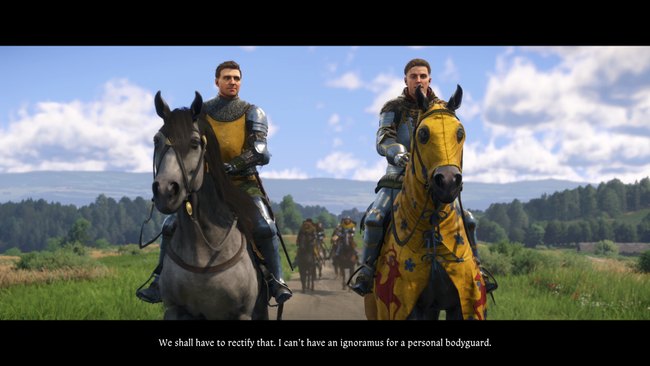
If you've played the original title, you already know that Henry's story in 15th-century Bohemia wasn't quite finished. He hadn't managed to reclaim his father's sword, he never had a chance to take revenge on Ishvan Toth or Markvart von Aulitz, and King Wenceslas was still apparently locked up by his half-brother Sigismund, who had claimed the Bohemian throne as his own.
If you haven't played the first Kingdom Come, know that you won't be completely lost, should you decide to jump into the sequel first. In the opening hours of the game, you'll encounter a variety of dialogue events and dream sequences that recap the broad strokes of the original game, both good for new players and those needing a refresher. While you could never get the full context and experience of the original title without playing it yourself, Deliverance II gives you a good substitute, and you'll get the general gist of what Henry has been through. The in-game menus also house a codex of people, places, and events, for those who wish to read further.
I think it's important to consider what type of role-playing game Kingdom Come Deliverance is, not only for those new to the series but also in examination of where it sits among its peers. When it comes to gameplay design, many role-playing games — both western and Asian — are often defined by components such as combat mechanics, class systems, party coordination, or skill trees. KCD's open-world places its focus a little bit elsewhere, leaning a little less on battle theorycraft and more on navigating the world and storyline through a variety of tools given to the player, of which combat is usually just one of several options available.
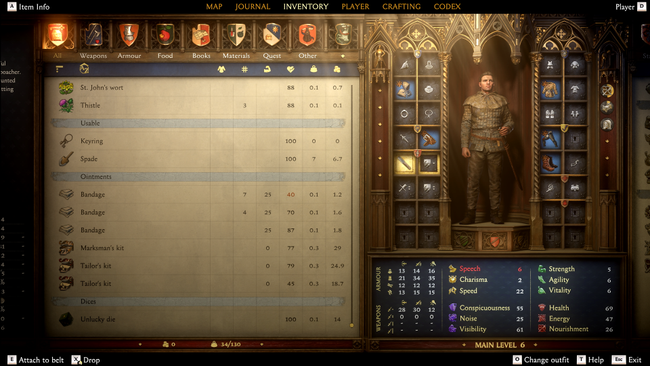
Much like the first game, almost everything in Kingdom Come Deliverance 2 is dictated by numbers, including abstracted meters for Henry's energy and hunger, the might and durability of every piece of clothing, how fresh food is, numerous player stats & skills, and more besides. Combat is certainly still a component of Deliverance 2, but it's a smaller piece of the roleplaying pie than what you would typically find in the genre, I feel. You aren't going to find yourself mowing down armies of orcs or wraiths or what-have you.
In some ways, Kingdom Come: Deliverance II feels like an immersive sim, with open-ended quest solutions organically responding to the actions of the player, sometimes leading to emergent scenarios unique to a particular player's playthrough. My character, at least starting out, was not very charismatic or persuasive, so I usually ended up in fisticuffs with disagreeable adversaries more than cordial delegations. In other ways, Kingdom Come: Deliverance II can feel more like a survival game, where money is scarce, food is limited, and resource management is key.
I think Deliverance's appeal is partially in contrast to its contemporaries, where it is less concerned with min-maxing a character build, party character dynamics, or intricate combat design. It is a mix of a 'play it your way' mentality combined with an abrasive world where numerous decisions need to be made, and not everything is going to go your way. It doesn't care to inconvenience the player, either. Sometimes you won't have an ideal solution to a conflict, whether in the main storyline or one of the game's numerous sidequests, and you'll have to make the best decision possible based on what you know and your current capabilities.
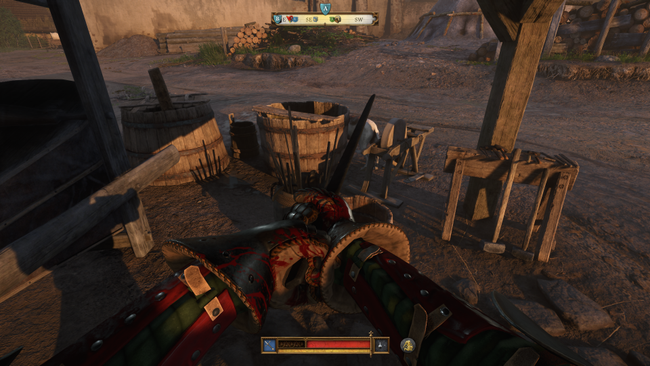
I could easily see how some people could be put off by the level of friction Deliverance II throws your way, especially early on. Henry, once again, starts out kind of pathetic and can barely navigate a skirmish nor a tense exchange of words. He'll break lockpicks on 'easy' chests and can barely hit a target with an arrow. You have to start out cautious and slow, as your various stats and skills are improved through exercised use. Steal from sleeping tenants to improve your Thievery, participate in archery contests to improve your Marksmanship, and so on. This is a role-playing game first and foremost, and your various aptitudes will improve over time, all abstracted by numbers and meters.
Deliverance 2 makes some smart adjustments to the role-playing systems of the first game, without losing that numbers-driven identity. For example, while Pickpocketing and Lockpicking were skills that had to be trained separately in the original game, now they have been combined under the Thievery skill, making it easier to manage and level up. The same goes for Herbalism and Hunting in the original title, which are now combined under Survival. Small adjustments like this make the progression just a little bit more natural this time around. I personally found skills like Alchemy and Drinking still fairly useless - I just bought or stole all the potions I would ever need to have, but perhaps other players might like to approach things differently than I did.
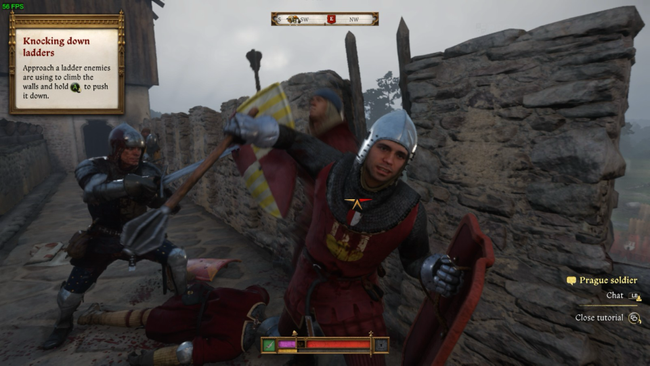
Also, Henry can now set three different outfit loadouts that can be switched at any time. Both Kingdom Come games have systems tied to Henry's charisma stat, which is dependent on the type of clothes he wears and how dirty he is. However, in the original title, you would manually have to switch around his clothes to raise this stat, which could easily become tedious. With Deliverance II's outfit toggle, I had my battle outfit (that I didn't care how dirty it got), and I could easily swap to my cleaner dapper 'dialogue' outfit at the press of a button. I also had a stealth/thievery outfit for sneaking around, which are probably the three common use cases most people will have for the three loadout slots you are given.
The game's first-person combat is also slightly refined from the original title, but not dramatically so. Honestly, my stance from my Kingdom Come: Deliverance review mostly holds water here, I feel. Battles can be claustrophobic and sometimes unwieldy. Henry doesn't have superhuman abilities to take out foes in a flashy, tidy manner. The only way you can take out your foes is to wear them out before they wear you out. You'll have to manage your stamina and blocking so you don't get overwhelmed, and even with high stats by the end of the game, you'll want to be careful to avoid being outnumbered.
And oh yeah, that restrictive system that prevents free saving at any time? It's no big deal to me, genuinely. Beds are abundant I ended up with more than 50 Saviour Schnapps by the end of the game, much more than I would ever possibly need to save my game at will.
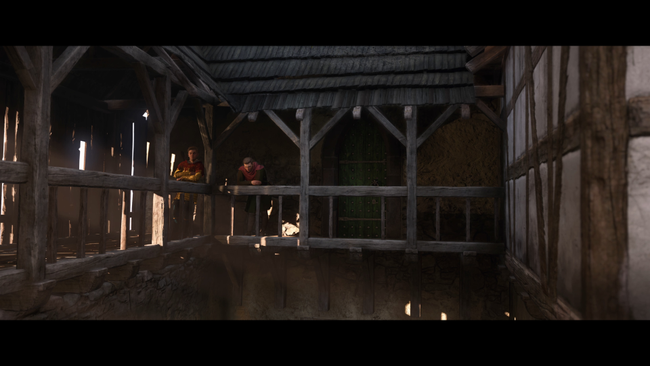
Separate from the dense role-playing systems themselves, one of the game's biggest strengths lies in its cinematic prowess. Honestly, Kingdom Come: Deliverance II has exceptionally impressive cutscene direction, perhaps some of the best I've ever seen in an RPG. Whereas I feel like most other game cinematics focus heavily on chains of dialogue, or action fight choreography, Deliverance II knows how to let scenes breathe in silence and body language, alongside well-executed shot composition, lighting, and camera angles. Scenes discussing the current political climate in the region are captivating, largely due to excellent mocap, voice acting, and scenery. I was already impressed with the voice performances in the original title, but Deliverance II is a notch above.
The overall narrative mostly manages to remain engaging, although a bit overlong. It's surprising how many new characters are introduced and organically woven into the storyline. Not every character is given equal importance and screentime, nor should they be, but the intersection of varying personalities, social status, and some ribaldry leads to a decent mix of compelling drama, pathos, and humor. There's a nice variety of main quest design throughout, too. There's a fun scenario where you have to save Henry's liege Hans Capon from the gallows by sneaking around Castle Trotsky at night. Another main quest has you investigating a fortress that has been overtaken by a group of bandits masquerading as the fortress' lords.
I do have a few small qualms with Deliverance 2's structure in places. While the game itself is open world, many of its main story missions feel somewhat divorced from it, opting to lean heavily on scripted sequences. Main missions oftentimes funnel you from one event to the next, and then to the next, sometimes for multiple hours at a time, which seems a bit at odds with the more open structure around those missions. There were a few moments where I felt these sequences went on a little bit longer than I would have liked, as I longed to return to the open world to explore around some more.
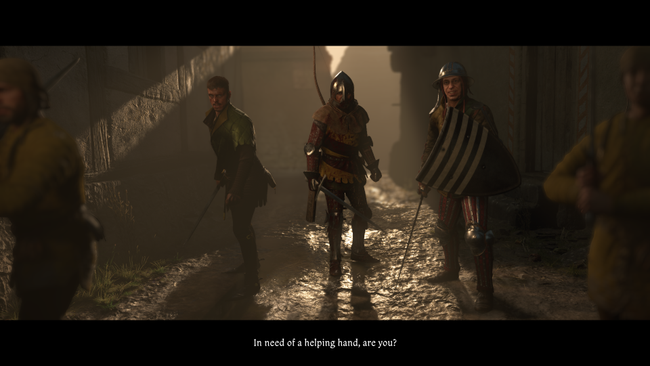
I think Deliverance 2 improves upon some of the portrayal issues of the first entry. Relatively early on in the game are some quests involving the Cumans, who were previously depicted as something of a faceless foreign adversary (often literally faceless as they usually wear masks). These early quests can result in something of a truce with a certain band of Cumans, where you get to learn a little bit more about a few Cuman individuals, followed by a somewhat comical night of heavy drinking.
Broadly, Cumans are still in league with the 'invading' Sigismund, framed as an antagonistic outside force and villainous by association, but an attempt to add some humanity to these foreigners is appreciated compared to the blanketly 'evil' depiction in the preceding game. There's also a significant questline with Romani people, as well as a section of the main story dedicated to the Jewish section of Kuttenberg.
There is also one black character in the game, Musa of Mali, who finds himself traveling with Sigismund's camp as a healer. He comes across as a competent physician, while making some commentary that one banquet in his home nation has more spice than all of Bohemia, and that the women here wear too many clothes in comparison. Understandably, he is seen to be an outsider by some around him. Depiction is not endorsement, though, and even though some characters can be assholes, I had Henry form a camaraderie with him. As a white American man, I may not have the best perspective to discuss these portrayals in-depth, but Henry appeared to charitably meet different customs at their level, even if they seem unusual to him at first blush.
Women are given a little bit more agency this time around too. In the first Kingdom Come: Deliverance, I felt practically every main female character was largely placed there as a sexual romance target first and character second. It's a bit better this time around. Katherine is a resourceful spy, respected well by her commander although she is sometimes the target of male chauvinism. Rosa is a perceptive and spirited young noblewoman, and a potential romantic interest for Henry, and I actually found myself wishing she was a little bit more present in the narrative than she ended up being. As far as relationships go, there are even a couple of male characters that Henry can romance, should the player choose to.
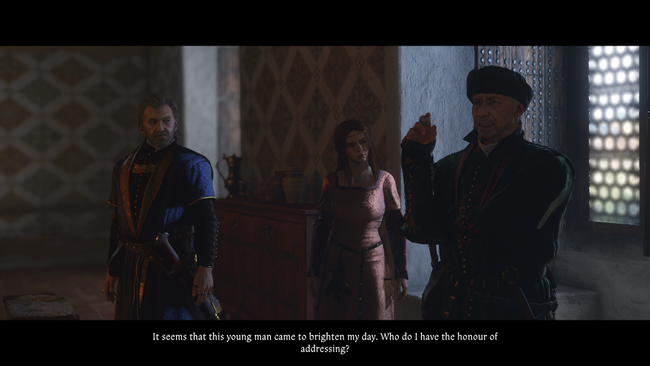
It's unfortunate that elements like these — having optional gay romance options and one (1) black character — have come under some fire by those in the worst corner of the player base. Game Director Daniel Vavra had already come under heavy scrutiny for the original Kingdom Come: Deliverance, cozying up to Gamergate rhetoric while stating that 'there are no black people in Bohemia'. Now, certain fans are throwing his words back at him, or worse. On Twitter/X, if you look at practically any post Vavra makes, you can find replies with brazen racial and gay slurs upset that the game is now 'woke' or whatever. It would be a little bit amusing in schadenfreude if it wasn't so sad and malicious.
You might be wondering if Vavra had changed his tune at all in recent years, due to these evident adjustments made in the sequel. Well, besides being generally provocative by taking a lawnmower to his social media feeds, when the review embargo lifted earlier this week, Vavra decided to spotlight the lowest-scored reviews on Metacritic, instead of being satisfied with a high 88 Metacritic score and a generally well-received game. This is not only childish to me, but also a little bit confusing. I think you would expect a game so dedicated to its style and vision — not intentionally aiming for a broad general-purpose audience — would hit some snags in its appeal. As trite as it is to say, Kingdom Come: Deliverance II is not for everyone; honestly I can appreciate a vision with some prickly edges that doesn't try to make everyone happy and appeal to every possible gamer.
I'm generally an optimistic person and I figure most people playing the game don't care about Daniel Vavra, won't blink at the inclusion of a black character, and won't mind if the game gives Henry the option to kiss another man. It's an optional dialogue choice that you don't have to make; a screen that, if you choose to bypass, takes 3 seconds out of a 100-hour RPG.
Despite the noise, I think Kingdom Come: Deliverance II is a remarkable RPG that offers a role-playing style not often seen. It does everything that a sequel should do, polishing up the rough edges of the original game and improving the scope while making smart adjustments to the gameplay. Combining dense RPG systems with immersive style and immersive cinematic aptitude, it's a strong showing for Warhorse.